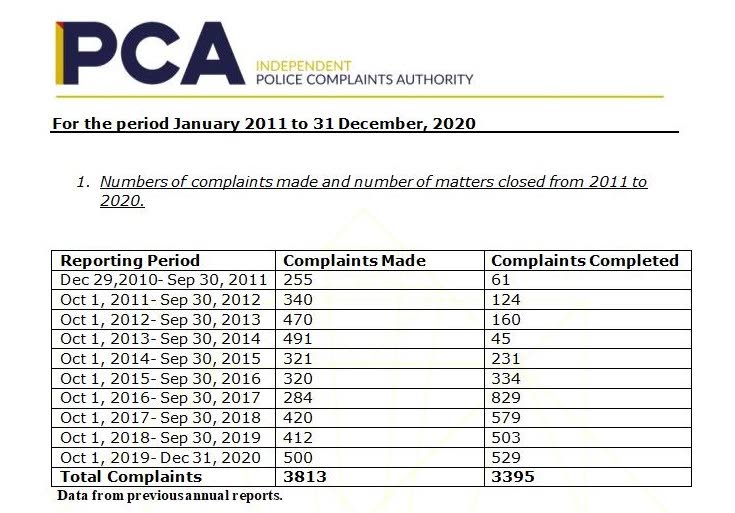Deputy director: Slow scientific reports stall PCA probes

WHEN it comes to investigating alleged unethical, unlawful or criminal conduct by police, one can seek justice via the Police Complaints Division (PCD) or the Professional Standards Bureau (PSB).
Both are units of the TT Police Service (TTPS). But there is also an independent body which – according to its deputy director Michelle Solomon-Baksh – ensures "bredrin not investigating bredrin" and to lessen the chances of corruption occurring in that process. That is the Police Complaints Authority (PCA).
Founded in 2010, the PCA investigates claims and passes on information to the Director of Public Prosecutions (DPP) and the police. This service is free. But the authority does not have the power to detain or arrest. One of the first things you would see on its website is: "We are not part of the TTPS."
"If there's a neglect of duty, you go in to make a report and the police officers don't take your report, (they) don't do an investigation or do a sloppy job, you can make a complaint to the PCD and they will write up the officer for discipline...You could be suspended in the worst-case scenario, you can have money deducted from your salary or you can have something called an orderly that's essentially an in-person disciplinary process where you're spoken to in a particular way...But we are the only independent body in TT that was created by statute to investigate both disciplinary and criminal conduct."
But not every complaint falls under the remit of the PCA, either. You wouldn't complain police had a hairstyle you didn't like or didn't smile when you said good morning.
The PCA Act defines a complaint as an allegation of "police corruption, serious police misconduct, the commission of a criminal offence by a police officer; or the commission of a criminal offence by any other person but involving a police officer."
"When a police officer assaults you, it is worse because this is somebody you're supposed to trust. He/she supposed to make you feel safe and secure so that betrayal is worse. So, it must be an independent organisation. It cannot be self unto self."
Many people often call the PCA a "toothless bulldog" owing to its limited powers. Solomon-Baksh said it is a comment she is familiar with but not one she agrees with.
"Justice has to appear to be done and to be done. So if you have brother investigating brother (like the PCD and PSB), it's very easy for someone to say 'I don't trust it.' That's why people lost faith and understandably so because they question whether these organisations were really looking at it fairly and truthfully...We are 100 per cent civilians here. They can't prosecute and that's how it is all over the world. There's a conflict of interest when you investigate and prosecute your own case. You wanna talk about teeth?"
The PCA has received 3,876 complaints since its inception. But from that, only 97 were sent to the DPP and 36 of that 97 were matters related to fatal police shootings from 2014 to now. Around 306 referrals were sent to the Commissioner of Police since 2014 as well.
"It is not every case you will get a finding of guilt of a police officer...Not every one that brings a complaint is going to find a case."
Sometimes, challenges in the investigative process are caused by complainants.
"They make a complaint and months down the road, they don't take our calls, (when) we send out our investigators, they don't give follow up information, when we look at the medical evidence, it doesn't match what they say...For example, a complaint that the police took a baton and cracked someone's ribs and skull, then the medical report shows nothing like that...We have closed a number of cases because scientific evidence doesn't match (their claim) or even their own witnesses giving different accounts."
Cases can also be closed if the complainant dies, the officer dies or if the officer has retired.

Some notable cases the authority has worked on, she said, are the torture of suspects who were wrapped in plastic and beaten by police, and a suspect in a sexual offence matter being burnt with boiling water and having pepper sauce smeared on his genitals.
She said the PCA should not have to take more than nine months investigating a complaint. But she said the delays the public commonly criticises the authority for is no fault of theirs.
"We base our reports on science. The delay isn't here, it's at the Forensic Science Centre. We have 42 matters outstanding at forensics."
She said the centre needs more resources and the lack thereof "clogs" the investigative process.
"We are relying on the Forensic Science Centre to give us their report and their scientific information. We are not going to send a report to the DPP without science."
She said before she and director David West came on board, there were delays the PCA could have been blamed for. But not anymore.
"A lot of the problems stemmed from case management. So our teams interrogated every single file, it was 1,100 (files) and within a year, we dealt with no less than 500. Case management is a tool that has been in the criminal justice system so we used that tool in there to bring us up to scratch."
One recurring issue, she said, is that the PCA is rarely notified on time to visit crime scenes.
Solomon-Baksh said processing crime scenes is crucial, so not being notified is "problematic."
But she said thankfully, with the advancement of technology, things have not been as problematic.
For instance, media reports, video footage from a witness or bystander and CCTV footage.
The authority has a free mobile application, for which it won the Inter-American Development Bank's People's Choice Award for innovation.
She admitted they had not been as vocal as they are now.
"But there's a reason we were quiet...Under the act, there is something called a confidentiality clause. So, it's not even a contract, it's the law. We could be breaking the law if we reveal too much information about some of these cases. (So now), we try to say as much as we can without breaking the law. You do not want to compromise the whole case or prejudice a whole investigation by saying too much about what you did."
She said since 2014, the police accepted several suggestions from the PCA including the use of body cameras, amendments to the use of force policy and the use of tasers. But one area she hopes to see more improvement in is the police's record management protocol as the PCA still receives regular complaints about matters not being investigated.
"In an ideal world, we shouldn't exist, right? Because police officers should do the right thing. But from what I see internationally, there are rogue officers everywhere...In every profession, you'll have the good and the bad. But in every democratic society, we need people to monitor what people in power are doing. When you give somebody so much power, you have to monitor them...The TTPS has respect for our role and powers."

Comments
"Deputy director: Slow scientific reports stall PCA probes"